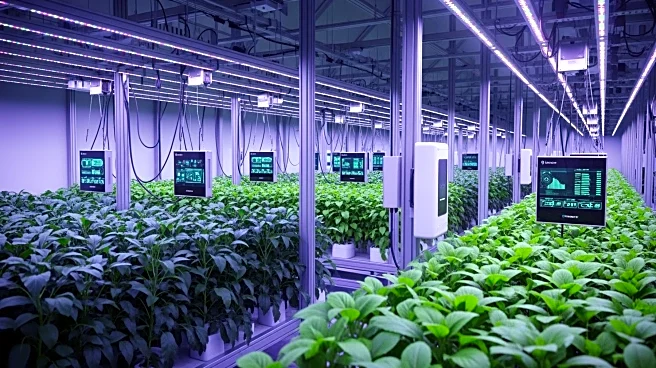What's Happening?
The Executive Secretary of the National Agricultural Development Fund (NADF), Mohammed Ibrahim, has emphasized the need for a data-driven transformation in Nigeria's agricultural sector. Speaking at the 25th
Annual Conference of the Nigerian Association of Agricultural Economists, Ibrahim highlighted the importance of innovation, technology, and evidence-based policymaking in achieving food security. He pointed out that despite Nigeria's abundant land and human resources, the lack of reliable and coordinated data hampers agricultural progress. This data gap affects various aspects of the agricultural value chain, from identifying genuine farmers to tracking yields and evaluating impacts. Ibrahim cited successful digital agriculture strategies in countries like Kenya, Ghana, and Rwanda as models for Nigeria to follow. He also announced the development of an integrated digital platform by the NADF to enhance agricultural financing and program delivery, aiming to ensure that every naira spent translates into measurable impact.
Why It's Important?
The push for a data-driven approach in Nigeria's agriculture is crucial for enhancing productivity and ensuring food security. By adopting digital strategies, Nigeria can improve transparency, accountability, and efficiency in its agricultural sector. This transformation is vital for a country with significant agricultural potential but facing challenges in resource allocation and impact measurement. The integration of technology and data can lead to better planning and decision-making, ultimately benefiting farmers, policymakers, and the economy. Moreover, supporting agritech ventures can connect farmers to markets and finance, fostering innovation and growth in the sector. The emphasis on data and technology aligns with global trends towards sustainable and efficient agricultural practices, positioning Nigeria to compete on a global scale.
What's Next?
The NADF's initiative to develop a digital platform for agricultural financing and program delivery is a significant step forward. This platform, in collaboration with private sector innovators, will track beneficiaries and monitor performance, aligning interventions with national data systems. The focus will be on ensuring that investments lead to tangible, evidence-based outcomes. Additionally, the NADF plans to design funding models to support agritech startups, further driving innovation in the sector. However, the success of these initiatives will depend on the collaboration between government, private sector, and academic institutions to translate data into actionable insights and sound policies. The ongoing dialogue at the NAAE conference suggests a commitment to exploring new pathways for integrating technology into Nigeria's food systems.
Beyond the Headlines
The move towards a data-driven agricultural sector in Nigeria has broader implications beyond immediate productivity gains. It represents a shift towards a more modern, efficient, and sustainable agricultural system that can adapt to global challenges such as climate change and food insecurity. By leveraging technology, Nigeria can build resilience in its agricultural practices, ensuring long-term sustainability and competitiveness. This transformation also highlights the importance of collaboration between various stakeholders, including government, private sector, and academia, to drive innovation and policy development. The focus on data and technology in agriculture could serve as a model for other sectors in Nigeria, promoting a culture of evidence-based decision-making and innovation.











